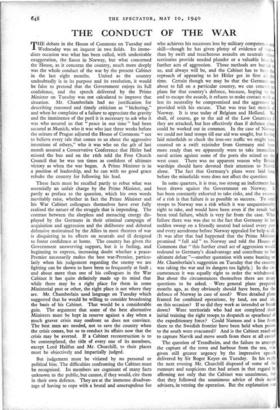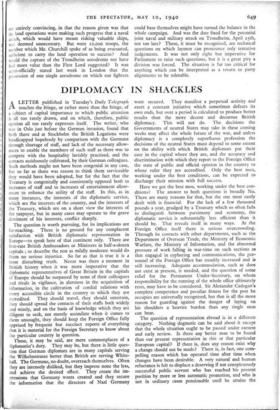THE CONDUCT OF THE WAR
THE debate in the House of Commons on Tuesday and Wednesday was an inquest in two fields. Its imme- diate occasion was what has been called, with undesirable exaggeration, the fiasco in Norway, but what concerned the House, as it concerns the country, much more deeply was the whole conduct of the war by the present Cabinet in the last eight months. United as the country undoubtedly is in its purpose and its resolution, it would be false to pretend that the Government enjoys its full confidence, and the speech delivered by the Prime Minister on Tuesday was not calculated to improve that situation. Mr. Chamberlain had no justification for describing reasoned and timely criticism as "bickering," and when he complains of a failure to appreciate the gravity and the imminence of the peril it is necessary to ask who it was who assured us that "peace in our time" had been secured at Munich, who it was who just three weeks before the seizure of Prague adjured the House of Commons "not to believe every tale that comes to us about the aggressive intentions of others," who it was who on the 4th of last month assured a Conservative Conference that Hitler had missed the bus and on the t6th told the Free Church Council that he was ten times as confident of ultimate victory as when the war began. A Prime Minister is in a position of leadership, and he can with no good grace rebuke the country for following his lead.
These facts must be recalled partly to rebut what was essentially an unfair charge by the Prime Minister, and partly as preface to the question, which his own words inevitably raise, whether in fact the Prime Minister and his War Cabinet colleagues themselves have ever fully realised the nature of the struggle that is impending. The contrast between the sleepless and menacing energy dis- played by the Germans in their criminal campaign of acquisition and aggression and the deliberate and debated defensive maintained by the Allies in most theatres of war is disquieting in its effects on neutrals and ill designed to foster confidence at home. The country has given the Government unswerving support, but it is feeling, and beginning to express, increasing doubt whether a peace- Premier necessarily makes the best war-Premier, particu- larly when his judgement regarding the enemy we are fighting can be shown to have been so frequently at fault ; and about more than one of his colleagues in the War Cabinet it has quite definitely made up its mind that while there may be a right place for them in some Ministerial post or other, the right place is not where they are. Mr. Chamberlain used language on Tuesday which suggested that he would be willing to consider broadening the basis of his Cabinet. That would be a considerable gain. The argument that some of the best alternative Ministers must be kept in reserve against a day when a much graver crisis may confront us does not convince. The best men are needed, not to save the country when the crisis comes, but so to conduct its affairs now that the crisis may be averted. If a Cabinet reconstruction is to be contemplated, the title of every one of its members, except Lord Halifax and Mr. Churchill, to their places must be objectively and impartially judged.
But judgement must be vitiated by no personal or political bias. The difficulties confronting the Cabinet must be recognised. Its members are cognisant of many facts unknown to the public, but cannot, if they would, cite them in their own defence. They are at the immense disadvan- tage of having to cope with a brutal and unscrupulous foe who achieves his successes less by military competenLe an skill—though he has given plenty of evidence of tha than by swift and treacherous assaults on neutrals vhos territories provide needed plunder or a valuable ba,e fo, further acts of aggression. Those methods are barred t us, and always will be, and the Cabinet has to hei,r oh reproach of appearing to let Hitler get in first all the time. Certain though we may be that the Germans are about to fall on a particular country, we can concert nn plans for that country's defence, because, hoping to the end to escape the assault, it refuses to make contact with us lest its neutrality be compromised and the aggressor be provided with his excuse. That was true last month of Norway. It is true today of Belgium and Holland. We shall, of course, go to the aid of the Low Countries if they are attacked, but less effectively than if defence plans could be worked out in common. In the case of Norway we could not land troops till our aid was sought, but having laid minefields to check the iron-ore traffic we might have counted on a swift rejoinder from Germany and been more ready than we apparently were to take immediate naval action against some of the ports she seized on the west coast. There was no apparent reason why British warships should have devoted their attention to Narvik alone. The fact that Germany's plans were laid long before the minefields were does not affect the question.
In some quarters, it is true, too strong an indictment has been drawn against the Government on Norway. It has been constantly exhorted to take risks, and the essence of a risk is that failure is as possible as success. To send troops to Norway was a risk which it was unquestionably right to take, and would have been even if the result had been total failure, which is very far from the case. What failure there was was due to the fact that Germany in her sudden swoop on a friendly neutral had seized every port and every aerodrome before Norway appealed for help at all. (It was after that had happened that the Prime Minister promised "full aid" to, Norway and told the House of Commons that "this further cruel act of aggression would redound to Germany's disadvantage and contribute to her ultimate defeat "—another quotation with some bearing on Mr. Chamberlain's suggestion on Tuesday that the country was taking the war and its dangers too lightly.) In the cir- cumstances it was equally right to order the withdrawal. But about the circumstances themselves there are many questions to be asked. - Were general plans prepared months ago, as they obviously should have been, for the defence of Norway in case of need? Were detailed plans framed for combined operations, by land, sea and air, on this occasion? If so did they work as intended or break down? Were territorials who had not completed their initial training the right troops to despatch as spearhead of the expeditionary force? Could Namsos and a line from there to the Swedish frontier have been held when points to the south were evacuated? And is the Cabinet resolved to capture Narvik and move south from there at all costs?
The question of Trondheim, and the failure to attempt the capture of the town and harbour from the sea, was given still greater urgency by the impressive speech delivered by Sir Roger Keyes on Tuesday. In his reply the next evening Mr. Churchill disposed of some of he rumours and suspicions that had arisen in that regard by affirming not only that the Cabinet was unanimous, but that they followed the unanimous advice of their naval advisers, in vetoing the operation. But the explanation was oc entirely convincing, in that the reason given was that the land operations were making such progress that a naval attack, which would have meant risking valuable ships, was deemed unnecessary. But were 12,000 troops, the number which Mr. Churchill spoke of as being evacuated, sufficient to carry the land operation to success? And would the capture of the Trondheim aerodrome not have bad more value than the First Lord suggested? It was semi-officially stated last week in London that the possession of one single aerodrome on which our fighters could base themselves might have turned the balance in the whole campaign. And was the date fixed for the potential joint naval and military attack on Trondheim, April 25th, not too late? These, it must be recognised, are technical questions on which laymen can pronounce only tentative judgements. It was not only right but imperative for Parliament to raise such questions, but it is a great pity a division was forced. The situation is far too critical for anything which can be interpreted as a return to party alignments to be tolerable.































 Previous page
Previous page